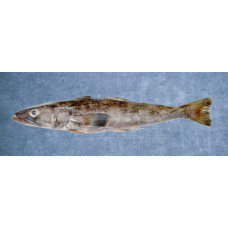Latin name
Dissostichus eleginoides
Other name
Chilean sea bass, mero, and icefish.
Identification
The Patagonian toothfish has a streamlined, spindle-shaped body that is 5-6.4 times its normal length. It has a flattened head with a wide, flat area between the eyes. The snout is longer than the diameter of the eyes. The mouth is large, set behind the centre of the eye. There are two rows of teeth on the upper jaw, the teeth on the outer row being larger and fanglike. The lower jaw has a row of spaced teeth that resemble fangs. Additional fang-like teeth are located outside the rows of teeth at the junction of the upper and lower jaws. There are two lateral lines; both flippers are composed of tubular scales, one at the top and the other in the middle of the sides. Number of vertebrae: 53-54. Lateral line of scales: 88-104 (upper), 61-77 (lower).
Features of fish fins
Dorsal spines (total): 8 - 10; Dorsal soft rays (total): 28 - 30; Anal spines: 0; Anal soft rays: 28 - 30.
Fish colouring
The overall body colour of the Patagonian toothfish is brownish grey with darker spots.
Distribution
The species is found in Antarctic and sub-Antarctic waters. Southeast Pacific and southwest Atlantic: south of Chile, along the coast to Patagonia (Argentina) and the Falkland Islands. Southwest Pacific: Macquarie Island. Southern Ocean: South Georgia. Also known from the sub-Antarctic islands and seamounts of the Indian sector.
Habitat
A pelagic-oceanic oceanodromous fish that prefers temperate climates. It inhabits depths between 300 and 2000 metres.
Size
The total length of this species is 70.0 cm. The largest recorded length is 215 cm. Maximum weight can exceed 100 kg. Maximum age is 31 years.
Behavior
Semi-pelagic juveniles sink to the bottom at depths of 150-400 m. Adults migrate to deeper habitats, to depths of over 1000 m.
Food and feeding habits
A predatory species, it feeds on small squid, fish, benthic invertebrates and carrion.
Reproduction
May spawn for the first time at about 8-10 years of age.
Fishing
Along with Dissostichus mawsoni, it is a valuable fishing target. It is caught using bottom longlines. High world prices for this fish encourage illegal fishing.
Relationship with a person
Harmless. The flesh of these fish has a high fat content (up to 30%) and excellent flavour.
| Classification | |
| Phylum | Chordata |
| Class | Actinopterygii |
| Squad | Perciformes |
| Family | Nototheniidae |
| Genus | Dissostichus |
| Species | D. eleginoides |
| Features | |
| Conservation status | Not Evaluated |
| Habitat | Pelagic |
| Life span, years | 31 |
| Maximum body weight, kg | 100 |
| Maximum length, cm | 215 |
| Sailing speed, m/s | No information |
| Threat to people | Edible |
| Way of eating | Predator |
Patagonian toothfish
Tags: patagonian toothfish

